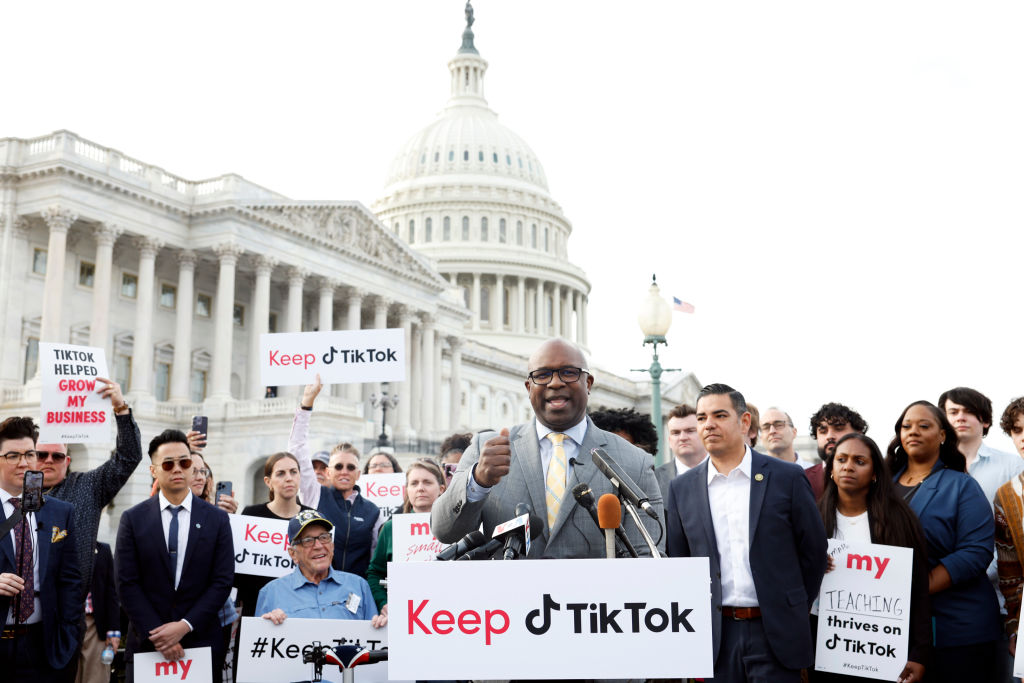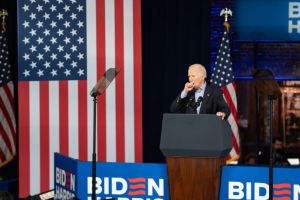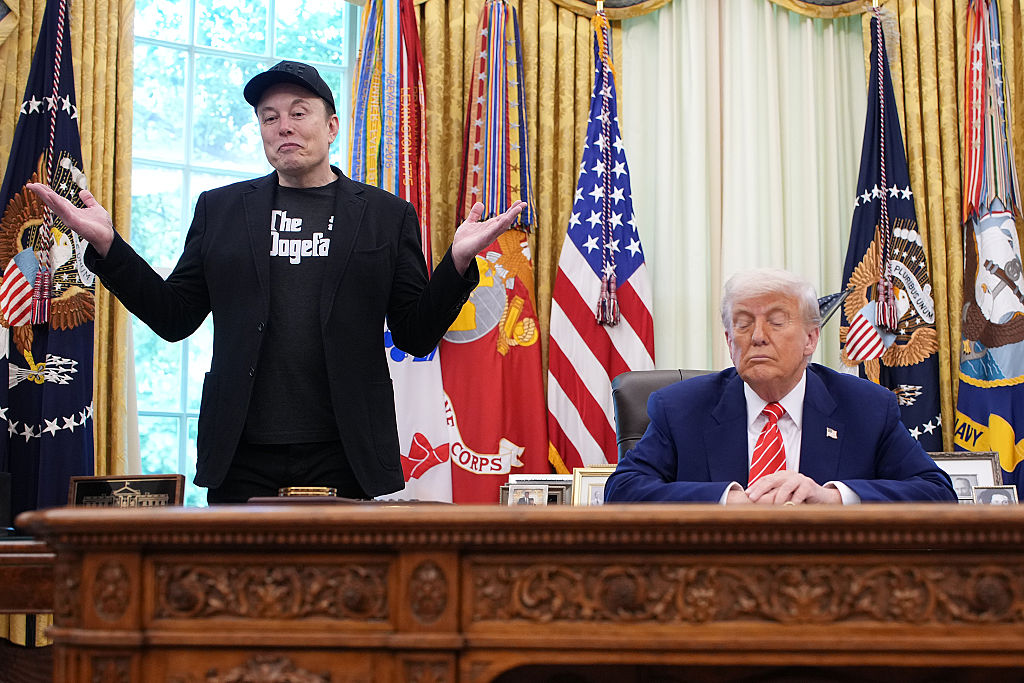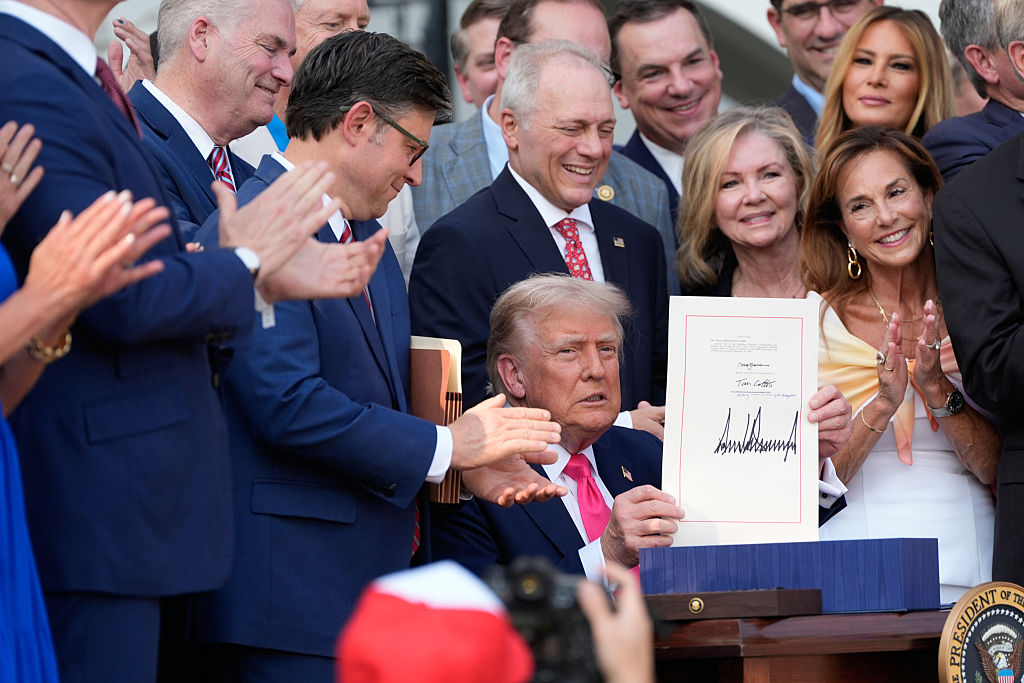TikTok’s CEO is gearing up for a grilling in Congress, but he’s got some new, powerful allies in his corner: a political consulting firm whose founder lavished praise on Mao Zedong and is now one of Biden’s top aides — and a socialist congressman who thinks banning the Chinese spyware is racist.
Shou Zi Chew, the company’s CEO, is headed for the House Energy and Commerce Committee, where Republicans are planning to press him on the national security concerns posed by the video app’s parent company ByteDance’s ties to the Chinese Communist Party.
Chew is an odd person to push back against claims by Republicans — and, increasingly, some Democrats — that TikTok is inextricably linked to the CCP. The Wall Street Journal recently reported that Chew, while working as a venture capitalist, was one of the first investors in ByteDance. As a Chinese company, ByteDance is subject to a Chinese law that “requires companies to give the government any personal data relevant to the country’s national security,” per the AP. In fact, Chew briefly served as the CFO of ByteDance before “he and the founder decided he would be better off running TikTok,” the Journal reported. The Chinese government itself actually “has taken a stake and a board seat in TikTok owner ByteDance’s key Chinese entity, Beijing ByteDance Technology,” according to Reuters.
But Chew is rolling into the hearing with friends in high places. In recent months, TikTok has brought on SKDK, which Politico calls “the most well-connected Democratic firm in Washington with former top employees in senior and mid-level roles in the Biden administration.” TikTok has spent over $10 million on its lobbying efforts in recent years, and its SKDK hiring is one of its latest moves. One of its founding partners, Anita Dunn, has been working in and out of senior roles in the Biden administration since its beginning — and favorable rhetoric about Chinese communists from the “D” in “SKDK” raised so many eyebrows in the past that it forced her out of the Obama administration.
In 2009, Dunn told a group of high schoolers that the mass murderer Mao Zedong was one of her “favorite political philosophers.” Dunn said that the mass murdering Chinese leader and Mother Teresa were “the two people that I turn to most” when blazing her own trail. Shortly after she made these comments, she resigned from the Obama White House.
Now, Dunn is in the Biden White House as a senior advisor, where she’s joined by a ton of her former SKDK colleagues, including deputy White House communications directors Kate Berner and Herbie Ziskend, deputy Pentagon press secretary Sabrina Singh, and Interior Department press secretary Tyler Cherry, per Politico.
TikTok is evidently hoping SKDK employees still have a cozy relationship with their White House counterparts — and watchdogs are raising red flags. Michael Chamberlain, director of Protect the Public’s Trust, told me that “these are the types of situations that contribute to the public’s growing mistrust of government. The revolving door between lobbying firms and the federal government is spinning as quickly as ever.”
There is currently no evidence of SKDK directly working with anyone in the administration on TikTok specifically. But Chamberlain pointed out that the Biden administration gives a lot of leeway on ethics. “While federal employees are prohibited from engaging with their former employers under many circumstances, we have documented more than seventy waivers handed out by the Biden administration to exempt political appointees from certain restrictions, including relaxing constraints on a number of former lobbyists,” he said.
Of course, the revolving door in the Biden administration goes both ways. Last year, TikTok plucked Jamal Brown, Joe Biden’s 2020 campaign press secretary and deputy Pentagon spokesman, to work in its communications shop.
Beyond the people TikTok pays to like it like Brown, it’s also found an ally in Representative Jamaal Bowman, who says that the push to ban the app is rooted in “xenophobia around China” and is “part of another Red Scare.” This is exactly the line of attack against TikTok’s foes that the CCP itself has been pushing, as Rob Lockwood pointed out on Fox News.
Bowman has TikTok accounts for both his government and campaign purposes. The Democratic Socialists of America’s favorite congressman rallied Wednesday with TikTok influencers who have been recruited as part of a last-ditch effort by the company to muster support. Bowman’s status as TikTok’s lone warrior is notable in part because so many of his fellow Democrats in Congress use the app, but they have been remarkably quiet in recent weeks.
Bowman’s TikTok pep rally isn’t exactly intimidating his colleagues. Representative Mike Flood, who’s been pushing for TikTok bans on the state and federal levels tells me that “it should be no surprise that the CCP’s favorite data harvesting app has turned to hired guns and mercenaries as it faces its final countdown.”
Despite a growing chorus of Democrats voicing concerns about TikTok, Bowman said, “I think the more we learn, the more you’ll see people stand up and defend TikTok.” He definitely hasn’t convinced Republicans; one staffer on the Energy and Commerce Committee said that DSA darling Bowman is now “on record as an ally of the Chinese Communist Party.” During his rally, Bowman said that the reason that Republicans want to ban TikTok is because they “ain’t got no swag.”
If it went that route, the US wouldn’t be the first country to ban TikTok. India, once home to the app’s largest customer base, successfully prohibited it in 2020. But Forbes is now reporting that despite the ban, “troves of personal data of Indian citizens who once used TikTok remain widely accessible to employees at the company and its Beijing-based parent, ByteDance.”
Even states in America that have banned TikTok on government devices still had trackers present on their state government websites as recently as last month, the Wall Street Journal reported. Per the Journal, “a review of the websites of more than 3,500 companies, organizations and government entities by the Toronto-based company Feroot Security found that so-called tracking pixels from the TikTok parent company were present in thirty US state-government websites across twenty-seven states, including some where the app has been banned from state networks and devices.”
Times have been tough for TikTok in recent weeks; even the Biden administration is criticizing the company, just a few months after it welcomed TikTok influencers onto the White House grounds (from which the app is banned). However, the Republicans on the Energy and Commerce Committee have been laying this trap for several months. Back in January, that committee’s chair, Representative Cathy McMorris Rodgers, announced that Chew will be testifying for the first time about “TikTok’s consumer privacy and data security practices, the platform’s impact on kids, and their relationship with the Chinese Communist Party.”
Heading into the hearing, the committee’s Republicans are more interested in figuring out the practical ways to ban TikTok than they are in hearing Chew tell them that a ban would harm the US economy. Representative Kelly Armstrong told me that he’s already looking towards the mechanics of how to implement a TikTok ban, which he’s previously told me he supports. North Dakota’s at-large congressman is weighing up the pros and cons of “an oversight board for a private entity because of national security concerns. What does that cost? What precedent does that set going forward?”
It’s not just Republicans on the House side who are concerned about TikTok. Missouri senator Eric Schmitt described the app to me as a “wolf in sheep’s clothing.”
I’m told to expect some fireworks during the hearing. As for Chew’s remarks? They’re unlikely to find too receptive an audience at this juncture, according to Congressman Flood. “There’s a building bipartisan consensus that we need a total TikTok ban in the United States and we need it now — for the good of our children and the future of our country.”

























